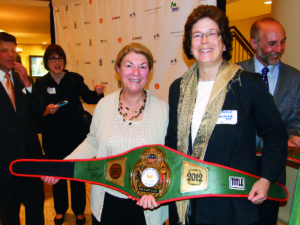
Summer 2018 ForestLife
Donor Profile: Andrea Tuttle, PhD

Former PFT Board Chair and PFT donor Andrea Tuttle, PhD (left), with PFT President Laurie Wayburn, accepting the Climate Action Champion Award from the Climate Action Reserve in 2012.
Dr. Andrea Tuttle served on the Pacific Forest Trust Board of Directors from 2004 to 2017, and as Chair from 2012 to 2017. [Editor’s note: We are pleased to note that Andrea rejoined the PFT Board of Directors in 2018!] She has had an extraordinary career serving the public as Director of the California Department of Forestry and Fire Protection (1999–2004), a member of the California Fire Alliance and National Association of State Foresters, and appointee to the California Coastal Commission and North Coast Regional Water Quality Control Board. We sat down with her to talk about her experiences with PFT.
How did you first learn about Pacific Forest Trust?
“I first got to know PFT when I was the director of the California Department of Forestry and Fire Protection. PFT President Laurie Wayburn asked me to support Senate Bill 812, carried by Senator Byron Sher, which created the mechanism for forests to be included as carbon offsets in a cap and trade system. I strongly agreed with the bill’s mission and worked within the Administration to support it. After my five years at CDF, Laurie invited me to be on the PFT board.”
Why are forests important to you?
“I’m originally a biologist, and forests are a crucial ecosystem. I decided to get a PhD in environmental policy to put my biological knowledge to use in actually protecting and saving habitats.
“Forests and the natural landscape are one of the few ways we can actually take carbon out of the atmosphere. Forests take carbon and sequester it for long periods of time.”
What do you find most rewarding about PFT’s work?
“PFT has been able to be a bridge builder. We advocate for policy and we work across the aisle. We make sure that natural and working landscapes are part of climate solutions. We’ve been successful at that, and there are whole new programs now that are being funded for forests, rangelands, and other kinds of working lands. We can sit at the table with rural legislators of whatever party, because we have a common goal for helping their constituents.
“In our work to establish technical standards for measuring carbon emissions, which are now widely accepted, a whole cross section of people who never used to come together—financial analysts, bankers, foresters, wildlife biologists—have created a robust forest carbon market and laid the groundwork for future climate laws. I’m proud that PFT has been instrumental in this.
“On the conservation side, every time we close on a new easement, it’s wonderful to feel that this is a real mark on the landscape, this will remain, and the land will be kept in forest use. It’s a privilege to have the opportunity to talk to landowners who have easements with PFT. You see the pride they have in their land, and how much they enjoy protecting and managing it. It makes you proud.
“I’ve been fortunate to have been able to use my policy experience, my political experience, my biological experience, and my international experience at PFT. It’s been a natural fit and it’s a great group of people.”
What challenges and opportunities do you see for PFT?
“PFT has been tremendously successful over the past 25 years. We have innovated policy and created pragmatic models on the ground—and they’ve taken hold.
“But the challenges for the next 25 years are even steeper in that the pressures on the landscape are increasing. As climate change alters whole ecosystems—and it’s already breaking our prior projections—there will be real challenges to the forests and natural processes that affect them. PFT will have to rise to the challenge and help determine how we handle these lands as they adjust to higher temperatures, drier soils, more wind, vector outbreaks, whatever it might be. There are plenty of issues left on the table for PFT to take on, but based on our first 25 years, we’ve come up with some pretty terrific mechanisms.”
More in this Issue of ForestLife
- President’s Letter
- Restoring carbon rich, climate resilient forests across the west coast
- A first for Oregon: Mountcrest Forest conserved
- What price a watershed?
- Pioneering progress on forest and climate policy
- Saving beavers, headwaters, and tall timbers at McCloud Soda Springs
- Forestry at Soda Springs: Back to the future
- A fabulous Forest Fete!
